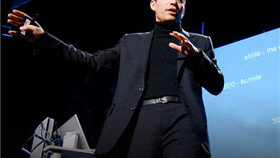So how would you run a whole country without oil?
怎么讓一個國家在沒有用石油的情況下運轉?
That's the question that sort of hit me in the middle of a Davos afternoon about four years ago.
四年以前在Davos的一個下午,這個問題突然浮現在我的腦海。
It never left my brain. And I started playing with it more like a puzzle.
我永遠不會忘記它。我越想越多,就像一個游戲。
The original thought I had: this must be ethanol.
一開始我想一定應該用乙醇。
So I went out and researched ethanol, and found out you need the Amazon in your backyard in every country.
所以我便開始學習研究乙醇,然后發現,每個國家必須得有個自己的亞馬遜來支持。
About six months later I figured out it must be hydrogen, until some scientist told me the unfortunate truth,
六個月以后,我覺得答案必定是氫氣,直到后來某科學家告訴我一個不幸的事實:
which is, you actually use more clean electrons than the ones you get inside a car, if you use hydrogen.
如果在汽車里使用氫氣的話,你其實用了比你所得到的更多干凈的電子。
So that is not going to be the path to go.
所以這并不是一個可行的辦法。

And then sort of through a process of wandering around,
然后經過反反復復的思考,
I got to the thought that actually if you could convert an entire country to electric cars,
我有了這樣一個想法,如果你可以將整個國家轉換到使用電力汽車,
in a way that is convenient and affordable, you could get to a solution.
在方便和經濟的前提下,那你便有了解決的方法。
Now I started this from a point of view that it has to be something that scales en masse.
我從一開始覺得我們的辦法只能在一個很大的范圍內可行。
Not how do you build one car,
這并不是怎么制造一輛車,
but how do you scale this so that it can become something that is used by 99 percent of the population?
而是怎么設計一個方案,可以讓百分之99的人都使用這種汽車。
The thought that came to mind is that it needs to be as good as any car that you would have today.
第一個想法便是這種車必須跟現在的車一樣好用。
So one, it has to be more convenient than a car.
因此,第一:它必須比一輛汽車方便。
And two, it has be more affordable than today's cars.
第二:它必須比現代的汽車便宜。
Affordable is not a 40,000 dollar sedan, right? Alright?
便宜的意思不是指一輛4萬美元的轎車。對吧?
That's not something that we can finance or buy today.
那可不是我們今天可以購買的汽車。
And convenient is not something that you drive for an hour and charge for eight.
并且,方便的意思不是說你得充電8小時卻只能開1小時。











